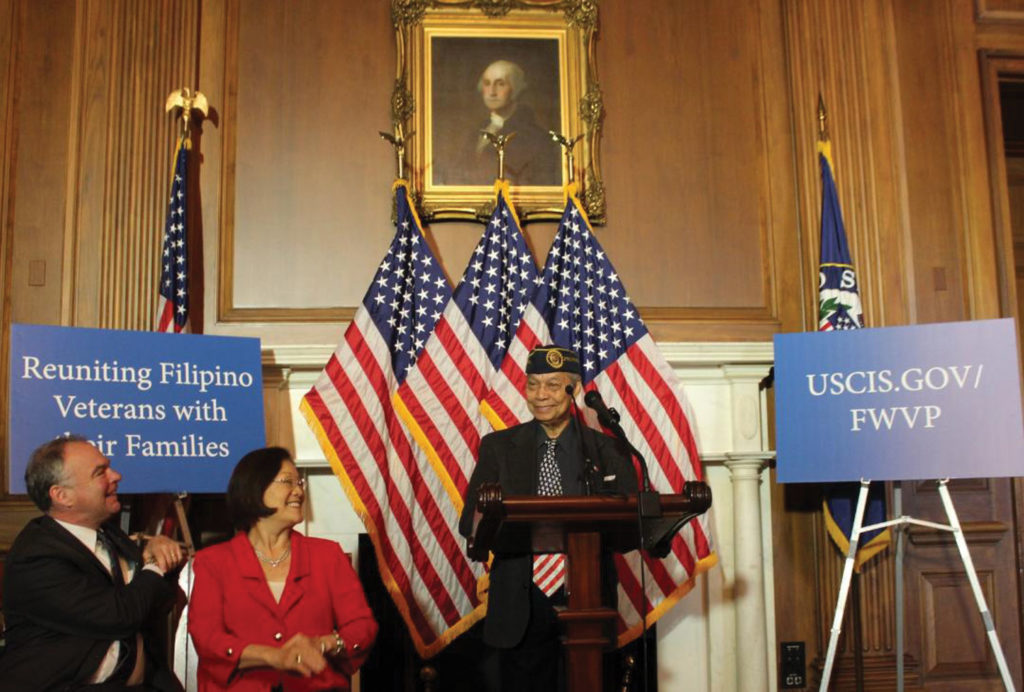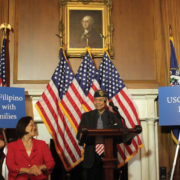
Filipino American veteran organizations are decrying the U.S. Citizenship and Immigration Services (USCIS) announcement to terminate the pathway that reunited Filipino World War II veterans with their families.
USCIS on Friday, August 2 said that it plans to cease the Filipino World War II Veterans Parole program in line with President Donald Trump’s 2017 executive order on border security and immigration enforcement that called for determining parole on a “case-by-case basis.”
Maj. Gen. Antonio Taguba, national chairman of the Filipino Veterans Recognition and Education Project, said the pronouncement is an “egregious act of injustice and discrimination.”
“This is another broken promise against our veterans. It is senseless and totally unacceptable to terminate a program that would have allowed children to rejoin their parents,” Taguba said. “It is patently arbitrary and unjust to target aging and ailing veterans who only have a few years to live.”
The administration said it will stop the categorical process and determine per case if the parole has “urgent humanitarian reasons or significant public benefit” consistent with the Immigration and Nationality Act.
“In a time where the Trump administration often questions the patriotism of others, we question where is that patriotism now for our veterans? When America needed them, our Filipino World War II veterans fought and sacrificed…Parole authority is provided when there is significant public benefit or an urgent humanitarian reason. The public benefit of our WWII Filipino veterans was met in their service to the country nearly 80 years ago,” Asian Americans Advancing Justice | AAJC, an organization that advocated for the parole program, said in a statement following Friday’s announcement.
The Filipino World War II Veterans Parole program, which was rolled out in 2016 under then-President Barack Obama, expedited the process for certain family members of the veterans — who are U.S. citizens or lawful permanent residents — to come to the country.
While waiting for their immigrant visas to be issued, these relatives could provide immediate support and care for the aging veterans, given that visa wait times for Filipino American families can exceed 20 years.
As of June 21, 301 Filipinos have received travel documents under the parole program since 2016 and 75 cases are still pending adjudication as of March 31, USCIS spokesperson Maria Elena Upson told the Asian Journal in an email.
Among the program’s beneficiaries is 89-year-old Rudy Panaglima of Arlington, Virginia, whose two adult children were able to come to the U.S. from the Philippines in 2018 to care for him and his late wife before she passed away.
“We served under the American flag, and yet we continue to be treated as if our sacrifices don’t matter,” Panaglima said, recalling the 1946 Rescission Act that denied Filipino war veterans benefits. “Who are we that the president should think less of us?”
Justice for Filipino American Veterans national coordinator Art Garcia said the Filipino American community “can never forget this transgression” and should consider policies like this during the upcoming election cycle.
While the phase-out of the program is not yet final, families who have benefited will be covered until it expires in June 2021, “unless otherwise terminated,” USCIS said.
The agency also suggested that it may allow a 90-day transition period for beneficiaries who have not adjusted their status after the parole expires.
Some immigration lawyers are suggesting that families in the meantime look for alternatives for lawfully staying in the country.
“Those beneficiaries of the program should proactively seek other avenues of lawful presence, including through more general parole programs, and other non-immigrant status until their priority date becomes current, at which point they can seek adjustment of status through their veteran family member’s petition. They should also explore other family and employment-based avenues to obtain permanent residence,” Darrick Tan, an attorney in Los Angeles who has advised several cases on the parole program, told the Asian Journal.
USCIS’ announcement on Friday also affects the Haitian Family Reunification Parole program.
Estimates show that there are currently less than 6,000 Filipino World War II veterans still living in the United States.
In recent years, there have been multiple efforts to honor the remaining veterans, including
the Filipino Veterans Equity Compensation Act in 2009, which rewarded a one-time lump sum payment to these veterans and their families. Before leaving office, Obama also signed a measure that awarded them with the Congressional Gold Medal, the highest civilian honor given by Congress.
The Filipino Veterans Family Reunification Act was introduced in both the House and Senate this past May to expedite the visa process for children of Filipino World War II veterans.







